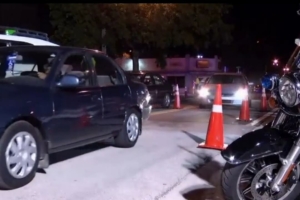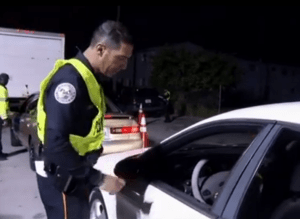
By: William C. Head, Atlanta DUI Attorney
What To Do After Your Arrest for DWI-OWI-OUI-DUI
1. Document all surrounding facts, events, and circumstances leading up to your confrontation with police, both prior to and after a vehicle pullover, during the time you spent with the arresting officer(s), and inside the police vehicle.
Starting when you are first aware of a patrol car tailing you, or pulling out from the shoulder of the roadway or a parking lot, take note of the time, the distance your vehicle was followed, and the position of the police vehicle(s) during pursuit and pullover. If you can turn on either your cell phone camera or a good phone recorder app, to attempt to capture (at least) the conversation that may be coming, this could be extremely valuable to your criminal defense attorney in a pre-trial motion to suppress, or during a jury trial. If the recording can also be saved remotely “in the cloud,” so that confiscation or destruction of your cell phone will not destroy the recording, this is the gold standard of preservation of police evidence.
Be aware that in 12 jurisdictions in the USA, such recordings or conversations by a video camera or tape recorder may be subject to two-party approval, meaning you have to tell the officer you are recording. These jurisdictions are CA, CT, FL, HI, IL, MD, MA, MT, NH, PA, and WA. In all other states, you don’t have to inform the other party that you are recording in a public place, such as on the shoulder of a public highway, in your vehicle. In March of 2014, a famous state Supreme Court case from Illinois, People v. Melongo, struck down the Illinois law prohibiting a citizen from recording the police officer investigating him at a roadside pullover. The eavesdropping law was ruled “overbroad” and the accused escaped punishment under the law.
Once the arresting officer has placed you in his or her vehicle to take you to jail for either processing or further testing on a DUI case, he/she may attempt to strike up what seems to be a friendly conversation, or ask you “innocent” questions. Adrenaline may be wearing off and you might feel more like talking or explaining your actions. DON’T DO IT! SHUT UP! Only your name and home address are required, and these can be provided non-verbally by showing your driver’s license that contains that information.
After you’ve been arrested, the time for you to explain your innocence to the officer has passed. You are not going to be “unarrested.” The officer has already made the decision to arrest you, even though this may not be a legal and constitutional arrest. Anything you say is likely being recorded, and even if not, what you say, and HOW you say it (e.g., with slurred speech), can and will be used against you in the subsequence prosecution of your criminal case.
That being said, many additional helpful tips provided below can help the DUI criminal defense attorney that you later hire. These are some issues that should be noted:
a. Did the officer say or read anything to you?
b. Did the officer talk to anyone else at the scene or on the way to the detention center?
c. Could you tell who he or she was speaking to, by listening to the conversation’s gist?
d. If you didn’t hear a name mentioned, did it appear to be a personal cell phone call or a police communication?
e. What was said, as close to the exact wording as possible?
f. Write down any details about the words of the arresting officer and any conversations as soon as possible.

For most DUI detainees (and other accused citizens arrested for misdemeanor crimes or felony crimes) the entire process of being jailed and booked is rude, invasive, hurtful, and embarrassing. However, you are not in charge. Lashing out at those around you will only make things worse. You will not win a war of words with law enforcement officers. By being combative or abusive, you may galvanize the cops against you. Remain silent, and do what you are told to do…nothing more. The Constitution protects you against non-Mirandized statements after being taken into custody.
Miranda rights are usually NOT given at the roadway for those taken into custody after a DWI-DUI arrest. For some other serious crimes, police may Mirandize a subject to try to get a quick statement that will be later used to convict the detainee. The 5th Amendment to the United States Constitution grants you the absolute right to remain silent and not incriminate yourself during your drunk driving arrest and the subsequent booking process. This right applies to everyone in every state–citizens, legal aliens, and undocumented aliens alike.
Your silence cannot be used against you in court under the Fifth Amendment, but your spontaneous, unsolicited statements (not gained through police questioning or interrogation) can be included in the prosecution’s case against you. Tell police or jailers that you wish to remain silent and that you want a DUI attorney before anything else occurs. But keep in mind that you should still be appropriately polite. Beyond providing the police with your identification documents, showing such as your name, address, and driver’s license number, you are not obliged to answer any further questions, such as your prior arrest record.
3. Note the names of ALL potential witnesses, jail staffers, and any sober and credible detainees or cellmates.
A significant part of your case may come down to the word of the officers against yours. In spite of the law requiring proof beyond a reasonable doubt at trial, most judges and jurors give significant credence to police testimony. Your side of the story gains credibility with every witness and every piece of evidence that you can gather for your defense.
Even if someone you met or saw in jail cannot add directly to your defense, he or she may be able to help in other ways, such as directly contradicting some claim by the officer about your aggressive demeanor or drunken behavior. To be able to utilize such evidence for your case, obtain the name(s) of the people you meet in jail (or remember those you met) and do your best to note their place of employment, city of residence, and phone numbers. If you are able to take notes, politely ask these individuals (guards, nurses, intake photographer or book-in personnel, other detainees, transport wagon driver, etc.) directly for their contact info and write it down as you go. If you have a detailed description of the person’s approximate age, race, height, weight, eye color, eyewear (glasses or no glasses), and hair color and length, your criminal defense attorney or an investigator may be able to locate this possible eyewitness. All this information goes to your DUI attorney and his or her investigator ASAP.
4. Use “911” to record a message if you are “stonewalled” or ignored by your jailers.
The law enforcement officers who are holding you may be too busy or may SAY that they are too busy, to give you the opportunity to obtain an independent DUI blood test or get in touch with a criminal defense attorney or family member. They certainly have different priorities for the night of your arrest than you do!
If something important happens (like you suddenly remember critical details about your situation, or you meet someone who may be pivotal in your defense, or you urgently need to establish an indisputable timeline) and the officers who are holding you are either stalling you from contacting your DUI lawyer or ignoring you entirely, any pay phone (and most jail phones) available for your use will let you dial “911” and record your message when the operator takes your call.
This public emergency system records everything, and these tapes are preserved for weeks after your call. At first, you may be chastised for wasting the operator’s time, but your statements requesting an independent blood test to prove your innocence will be preserved as possible evidence for your criminal lawyer to use. Remember, though, anything you say (and HOW you say it) becomes accessible and usable by the prosecutor as well.
5. Get help posting your bond and get out of jail ASAP.
As a general rule, nothing good happens while you are in jail. Anyone you meet who might later be used as a witness on your behalf will only recall your dilemma if you tell him or her why you may need his or her help once you get out of jail. Often, the other person in custody is just like you, a reputable citizen and business person who has been arrested and detained for an alleged crime.
If possible, any potential witnesses for you at the arrest location need to write down some notes or take some cell phone photos while these details are fresh in their minds. Any physical evidence at the scene of your arrest (particularly after an accident) may be rained upon, driven over, or otherwise altered by friction from other tires or the forces of nature. The location where you were required to perform your field sobriety tests can be very important to your criminal DUI defense.
Your car may still be in the parking lot where you were stopped, or at the tow service storage yard until you get out of jail. The police already inventoried the contents of your vehicle, and likely have obtained and documented most of the evidence of your alleged crime (such as an open container of alcohol as proof of your possible impairment by alcohol), which is going to be used by the prosecution against you. New evidence of another criminal act (e.g., simple possession of marijuana) may be discovered by police during their inventory search, and then you also face these criminal drug possession charges.
No useful purpose is achieved by spending extra time in jail rather than immediately retaining a criminal defense lawyer whose local connections and experience in your court will provide you with the best DWI-DUI attorney possible. Then, (through your legal counsel) he or she — along with an investigator who will later act as a witness in your case — can get busy documenting evidence and gathering facts and information for your defense at trial. Waiting even one additional day to have your DUI alcohol lawyer or DUI drugs attorney will only work to your detriment, in many cases.
6. Record your side of the story and contact a DUI lawyer immediately.
Immediately after you can get out of detention, call the best DUI attorney in your local court jurisdiction, and set an appointment to see him or her ASAP. Memories QUICKLY fade, especially on the EXACT details of conversations with police, jailers, etc. Plus, over 90% of all OWI-DUI-DWI arrests trigger an administrative license suspension or administrative license revocation action that may cost you the right to continue driving. These administrative license proceedings have short “appeal” deadlines, so act quickly to protect this valuable legal right.
Next, write down all details of your events of the entire day of your arrest, and the exact conversations between you and any law enforcement officer after the stop, even including things said at jail. Some of the most critical details that could help in your eventual defense happened not at the scene of your arrest, but in the minutes and hours before your contact with police, and what you remember as part of your arrest processing. This quick checklist of things to WRITE DOWN will get you started:
a. When did you wake up, prior to the arrest?
b. Did you take any medications within the last 24 hours before arrest?
c. Did you ingest ANY illegal drugs that may appear in a DUI blood test or DUI urine test?
d. Was anyone with you at critical times of the day who could vouch for your sobriety?
e. What circumstances led to you getting behind the wheel, especially if you were unaware that you would be driving?
f. Before you were pulled over, how long had it been since you slept?
g. Write down everything you ate, everything you drank, everywhere you went, and the names and contact numbers of everyone with whom you spoke.
h. Did you “smell like alcohol” or “smell like marijuana” for any reason when pulled over? Simple details like what aftershave or cologne you might have put on before your arrest or being around others smoking weed may be very important.
i. Did you eat with a friend or at a restaurant with internal security cameras shortly before your police pullover and arrest?
j. Many computerized billing receipts obtained from bars and restaurants can help provide the name of a wait staff worker or the bartender’s name when investigators go back to track down favorable witnesses.
k. Document everything for your DUI lawyer, and let him or her sort through what is potential evidence that may be used for court.
7. Recover your vehicle and have a good friend or investigator take digital photos or even video footage of your car, inside and out.
As soon as you are released from your DUI-DWI arrest, you will want to get your car. Tow truck drivers are notorious for not rolling up vehicle windows, or even raising convertible tops. You want to protect your property inside the vehicle from theft or from exposure to the elements ASAP. If your vehicle was parked in an unsecured area or private parking lot, you want to recover it as swiftly as possible. These businesspeople will have your car towed, even if the police did not.
Most tow company lots are not exactly secure either. Things like your garage door opener may be taken, and later a burglary will take place at your home, using the street address obtained from inside your unlocked vehicle on the tow company lot.
Also, if for whatever reason your driver’s license is suspended when you are released, have someone else drive the car home for you. It is not unheard of for a police officer to tell a tow yard worker to call him or her IF you try to come get your car, and that officer will then arrest you again.
In terms of your defense of criminal charges, it is also prudent to retrieve your car at once so that you can have someone else take pictures (digital or high definition video is preferred) of the vehicle inside and out. It needs to be someone else, so we can put that witness on the witness stand at trial, and not put you on the witness stand.
Be sure to obtain pictures of any alcoholic containers (bottles, glasses, etc.) or alcoholic beverage packaging (cardboard, paper bags, etc.) that remain in your vehicle, both where they were located when you first opened the vehicle, and also when moved outside of the car. Also get a friend to make photos of the scene of your DUI arrest, with your car in its original position, if possible. Later, using police video camera footage, an investigator may re-enact this, if the car has been moved after your drunk driving arrest.
8. Keep quiet about your arrest details and stay out of legal trouble while the case is pending.
A DUI conviction for driving while intoxicated can affect your job, your insurance rates, and your life. While your DWI case is still active, the two best things you can do are to stay quiet about the facts of your case, and stay out of trouble! Only give this info to your DUI attorney.
Theoretically, any words you say while the drunken driving case is pending can be used against you. Your chat with your co-worker could come back to haunt you if the prosecutor comes to speak with him about any details he may know. The only person who should know the entire situation is your drunk driving attorney. If married, you may have a right to spousal immunity, but sometimes, divorce creates a potentially incriminatory witness against you.
Ask your criminal attorney at the DUI law firm representing you how to broach the topic of the DUI arrest with your employer, and how to arrange time off to be at mandatory court proceedings. Some employment contracts or HR manuals mandate self-reporting, but many do not. If you are driving a company-issued vehicle, your likelihood of self-reporting are much greater. Plus, with some jobs, waiting too long to report is worse than being arrested for DUI, and can be the basis for immediate termination. Remember, bad news does not age well.
Most importantly, keep your criminal record spotless while the case is pending. Nothing can terminate negotiations with your DUI prosecutor for a possible reduction of intoxicated driving charges quicker than a new violation, especially if it is an alleged impaired driving accusation. Stop at all stop signs, use turn signals, and by all means do not have even a sip of alcohol and then drive.
9. Get focused, get busy, and get over it!
Do not allow this arrest to take over your life. Once you hire your DUI attorney, shift the burden of the case to him or her. Keep working at your job. Not only will this help keep some normalcy in your life and give you a positive distraction, but it will also help you pay for what can be an expensive legal process. This expense is not just in legal fees. You must also consider other court-related expenses such as court fines, investigator fees, fees for expert witness testimony, court reporter costs, and taking off time from work to deal with the case proceedings, among other expenditures. Re-evaluate any vacation days or personal leave time that you have accumulated, and discuss this with your criminal defense lawyer.
Stay positive! Increase time spent at your church, or do more volunteer work. Start an exercise program. Just move forward on the right path, whatever that may be for you.
Your criminal lawyer may also suggest that you be screened by a professional mental health professional who is state-certified to assess addiction. This step can be highly valuable in some cases. In addition, even where your criminal attorney may be able to obtain a reduced plea of reckless driving or other non-DUI disposition, you will very likely have to complete DUI school and be screened for alcohol addiction or drug addiction (or dependency) as part of the plea negotiations.
If you suspect that you have a problem with alcohol/drugs, ask your OWI-DWI-DUI attorney for a referral to a state-approved treatment and rehabilitation program that can only improve your quality of life. This early action to obtain voluntary treatment may be vital to your case later, whether you go to trial or not. Plus, the last thing your drunk driving defense lawyer wants to hear is that you got a new arrest while the first DUI is pending.
About the Author:
Atlanta DUI lawyer William C. “Bubba” Head has written about the topic of drunk driving extensively and has lectured about differences in both the burden of proof and the necessary legal proof required in various states under their drunk driving laws.
The foregoing materials were included in his national DUI-OWI-DWI book, “The DUI Book”, published in 2006. Learn how to get a PDF copy of this FREE book at The DUI Book.
For Mr. Head’s Georgia DUI laws and an outline of minimum mandatory DUI penalties, go to this site: .
DUI Implied Consent is a trap for the unwary. In almost every DUI-DWI arrest the officer gives an implied consent warning, and this advisement can determine whether you can continue to drive, prior to the criminal case ever being decided. PROMPT attention to appealing this administrative license suspension or administrative license revocation is imperative. Don’t WAIT! Call a top-rated DWI–DUI lawyer in your court location at 1-888-839-4384, for assistance in complying with local laws on DUI vs DWI.
See this important posting about Georgia’s implied consent to see a “trap for a driver trying to handle the case without legal help”:
DUI vs DWI Summary –
https://youtu.be/g-KZrRhqhLs Mr. Head discusses felony DUI versus misdemeanor DWI on YouTube.
Interested in seeing what occurs to your life IF you get convicted of DUI or DWI? Go to this DUI penalties link:
Have you been arrested for OWI or DUI?
Contact a top-reviewed DUI attorney near you right now to preserve your legal rights. Your first consultation is FREE, and we will send you a FREE PDF copy of the 430-page “The DUI Book…A Citizen’s Handbook on Fighting a Drunk Driving Case.”

Find The Top-Rated DUI Lawyers Near You
We have listings for the top DUI lawyers in all 50 states and the District of Columbia. Find the best DUI lawyer for you by clicking on your state here.




